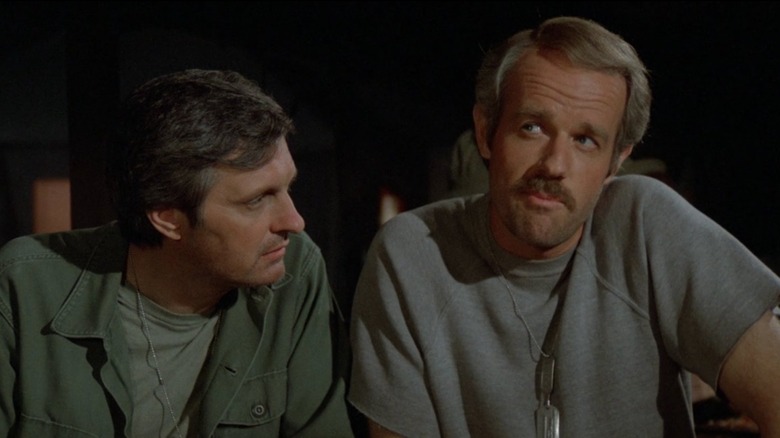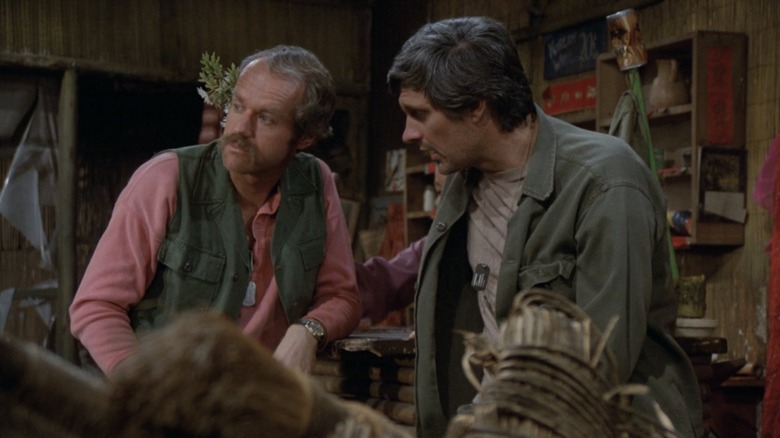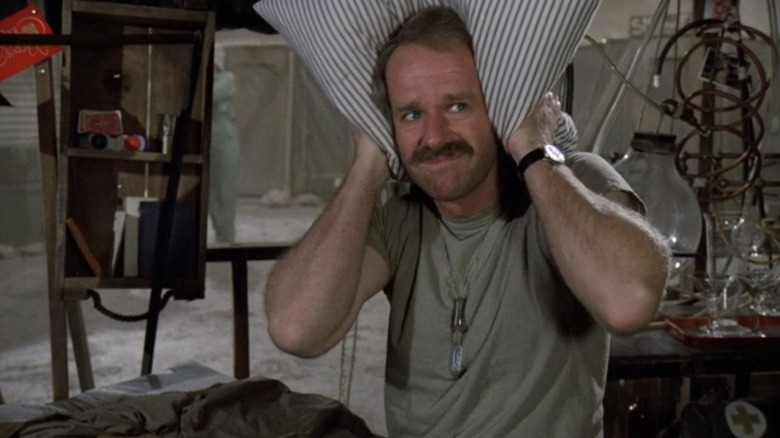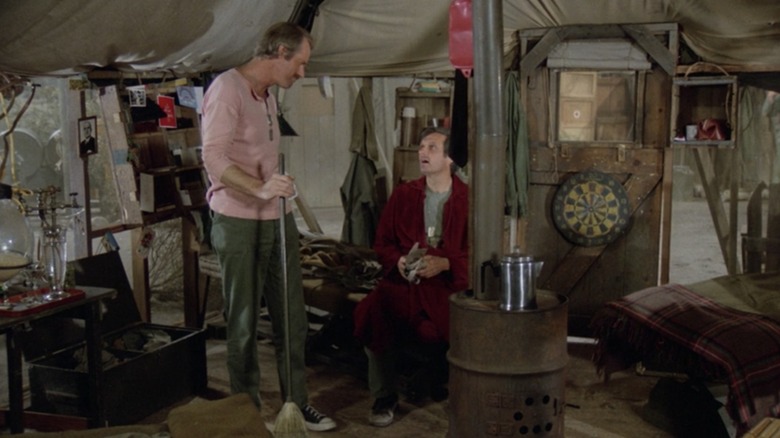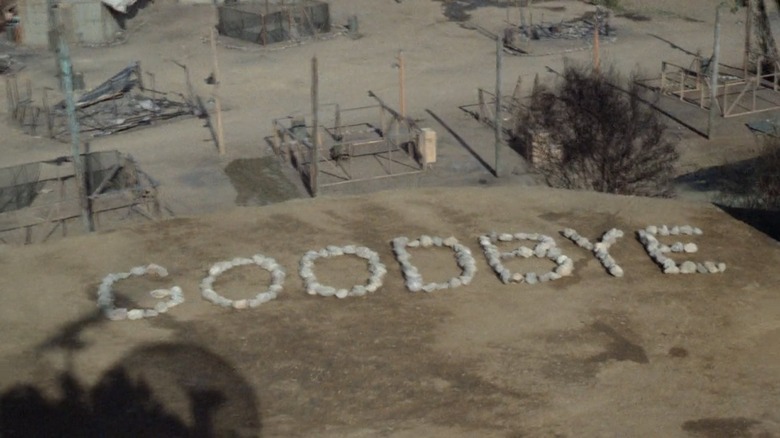Alan Alda Asked ChatGPT To Write A M*A*S*H Episode, And It Was All About Superstitious Underwear
For "M*A*S*H" fans, the best time of year (aside, perhaps, from the show's birthday — it just turned 50 in 2022) is pretty much whenever cast members from the beloved military comedic drama end up in the same place. It's rare to see these actors and artists, now mostly in their 80s, reunite, so when they do get together, it always feels like a special celebration. The most recent reunion came earlier this year when B.J. Hunnicutt actor Mike Farrell popped over to Alan Alda's long-running science and communication podcast "Clear+Vivid" to help him read a scene from "M*A*S*H." Except, there was a catch: the brand new scene from the show that ended back in 1983 was actually written by artificial intelligence, with some strong guidance from Alda.
If you recoiled a bit at the mention of AI writing there, that's totally understandable. But it's worth noting that this podcast was recorded before AI became a cornerstone issue in the Writers Guild of America and Screen Actors' Guilds' ongoing fights for equal pay and fair treatment. The WGA and SAG-AFTRA strikes were still a few months away when Alda got on the phone with Farrell to read a ChatGPT-made "M*A*S*H" episode, but their ultimate takeaways from the experience demonstrate exactly why writing should be left to, you know, real human writers.
Alda performed a scene with Mike Farrell for the first time in decades
In the episode "Alan chats with the bots," Alda introduces the segment by noting how long it's been since his Hawkeye and Farrell's B.J. shared space together. "I haven't acted with my pal from 'M*A*S*H,' Mike Farrell, in 40 years," said Alda, "but I thought it would be fun if we both had a go of reading this scene that was written by a robot." The actor and filmmaker, who happened to write 19 episodes of "M*A*S*H" himself back in the day, was clear from the get-go that the pair wouldn't be reading the first prompt response the AI writing program spit out. "After many tries and much prodding, it finally came up with something like a scene," Alda explained, later noting that he also cut and rearranged some lines to make the script readable, and came up with the scenario and tone of the characters' responses.
The scene itself doesn't sound half-bad, but that's probably because Alda shaped it — and because of the undeniable joy that comes with hearing these two fall back into character with ease again after all these years. Farrell's BJ is sarcastic yet calm, a perfect companion to Alda's borderline-manic Hawkeye. The scene sounds like a typical first-act setup, in which Hawkeye gets defensive when he loses his lucky underwear, then even more defensive when BJ calls him superstitious. It's easy to see how this could've fit into a "M*A*S*H" episode sometime in the later seasons (think mustache era Beej), as Hawkeye and BJ began passing the time with increasingly wild mind games and bets.
'That's a little scary'
The only problem is, it's not funny at all. The sole attempt at a joke in the scene involves Hawkeye's grandma calling the underwear her "little secret weapon," which is a total non-punchline. It's jarring to hear a scene read from a show that's known for its zingers fall so flat. "Then I said make it funny," Alda explained after the reading, listing all the prompts he gave the bot: "That might have been my downfall." The writer and actor notes that "when it tried to make it funny, it came up with really stupid stuff and it got stupider because it went along."
Alda's podcast typically approaches emerging technologies with an open mind, and this episode is no exception, but he and Farrell certainly expressed some concerns about the AI revolution. "That's a little scary. The idea is people are going to actually write scripts this way now?" Farrell asked, to which Alda was doubtful. "It works as a collaborator, not as a writer," he concluded. "I can't believe you could take a draft that it produces and get up and act it." He noted that no matter how much he tried to guide the bot, it always ended up with a script that ended on a sentimental note — a choice, I might add, that no human who's seen "M*A*S*H" in all its heartbreak would ever make.
Farrell says AI can't capture the human spirit
Personally, I'm curious about where an AI bot like this would even pull its ideas from. Does it have access to "M*A*S*H" scripts, and if so, from which seasons? Could it be pulling from fan-fiction, blogs, or commentary on "M*A*S*H" that's been published over the years? The 11 season show went through many tone shifts during its run, and it's hard to imagine even the more advanced machine could take all of them into account when trying to write for it. Plus, there's the obvious argument to be made that pulling from any of the above would be plagiarism, including perhaps stealing from writers who are no longer around to defend themselves.
Farrell put it best in the "Clear+Vivid" episode, telling Alda:
"The whole thing unnerves me. The idea of artificial intelligence taking over what is an industry that's fundamentally creative, out of the human mind and the human spirit. Yes, I understand they can parrot the human mind, but I can't imagine that they can ever come close to parroting the human spirit."
It's a sentiment that feels perfectly in line with the arguments put forth by many a WGA member over the past months, and Alda shared a similar thought about the way AI could impinge on the role of actors. He explained the concept of a cloned and dubbed voice performance to Farrell, saying, "The idea that they can do it sort of diminishes our role in the whole thing."
People wrote M*A*S*H, and it's better for it
Alda also (perhaps inadvertently) made a good point when reminiscing offhand about "M*A*S*H" table reads, noting that after each one the cast would "talk with the writers and producers about how we felt about it." If Hollywood does end up with AI-generated scripts, even if writers give them a polish afterward, I can't imagine it would be easy for them to evolve as needed throughout the production process — because there would be no person on set or a phone call away who actually knows the story best after creating it from scratch.
AI certainly could never write something as groundbreaking as "M*A*S*H." Across its decade-plus run, the show evolved from a TV clone of a Robert Altman film into a boundary-pushing anti-war comedy, then into television's first major hit dramedy, before finally signing off with a feature-film length masterpiece that goes about as deep on the human condition as any TV show has before or since. The show is an enduring cultural touchstone thanks to creator Larry Gelbart, Alda, Farrell, and so many more writers, actors, and filmmakers who made it everything it was — and still is.
Alda and Farrell's lively and thoughtful conversation demonstrates all of this, but perhaps the best proof of humanity's obvious supremacy over machine comes when Alda makes a better quip off the cuff than the AI bot did after multiple attempts at cracking a joke. "Why have a robot write a script and try to interpret human feelings when we already have studio executives who can do that?" the actor jested. You tell them, Hawkeye!
